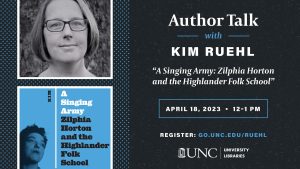
The Southern Folklife Collection and UNC University Libraries are excited to announce this forthcoming Author Talk featuring Kim Ruehl, Tuesday, April 18th from 12-1 EST. Ruehl will be discussing her book A Singing Army: Zilphia Horton and the Highlander FolkSchool, named one of NPR’s best books of 2021.
Register at go.unc.edu/Ruehl to join us for this free, virtual event.
You can read an excerpt from Ruehl’s book here, the first ever on Horton, in this piece on Country Queer: https://countryqueer.com/stories/article/book-excerpt-zilphia-horton-protest-song-pioneer/

Field Trip South has documented holdings and highlights from the Highlander Research and Education Center (#20361) many times over the years, and we invite you to explore these posts for some background on the center.
Early Protest Songs from the Highlander Research and Education Center
Phillip MacDonald’s Field Experience with the Highlander Research and Education Center Collection
The SFC is also proud to hold the Guy and Candie Carawan Collection (#20008). In 1959, Guy Carawan succeeded Zilphia Horton as director of the music program at Highlander Folk School after Horton’s death in 1956, and both Guy and Candie were heavily involved in the School and Center. Here are a couple of posts about their collection.
Documenting the origins of SNCC in the Guy and Candie Carawan Collection
We look forward to seeing you on the 18th for this presentation and discussion on this pivotal figure in the Civil Rights movement, and learning more about her organizing and educating at the Highlander Folk School. go.unc.edu/Ruehl

